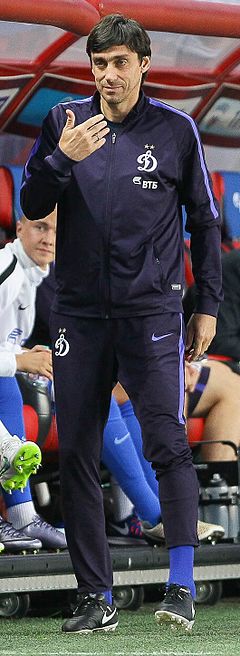Yuri Kovtun
 Working with Dynamo Moscow in 2016 | |||
| Personal information | |||
|---|---|---|---|
| Full name | Yuri Mikhailovich Kovtun | ||
| Date of birth | 5 January 1970 | ||
| Place of birth | Azov, Soviet Union | ||
| Height | 1.91 m (6 ft 3 in) | ||
| Position(s) | Defender | ||
| Team information | |||
Current team | FC Arsenal Tula (assistant coach) | ||
| Youth career | |||
| SDYuShOR-3 Azov | |||
| ROShISP-10 Rostov-on-Don | |||
| Senior career* | |||
| Years | Team | Apps | (Gls) |
| 1987–1988 | FC Luch Azov | 36 | (1) |
| 1989–1990 | FC SKA Rostov-na-Donu | 61 | (0) |
| 1991–1993 | FC Rostselmash Rostov-on-Don | 61 | (1) |
| 1993–1998 | FC Dynamo Moscow | 156 | (5) |
| 1999–2005 | FC Spartak Moscow | 121 | (7) |
| 2006–2007 | FC Alania Vladikavkaz | 29 | (5) |
| 2007 | FC MVD Rossii Moscow | 11 | (0) |
| 2011–2012 | FC Arsenal Tula (amateur) | ||
| Total | 455 | (19) | |
| International career | |||
| 1994–2003 | Russia | 50 | (2) |
| Managerial career | |||
| 2007–2009 | FC MVD Rossii Moscow | ||
| 2010 | FC Salyut-Energia Belgorod (assistant) | ||
| 2013–2014 | FC Volga Nizhny Novgorod (assistant) | ||
| 2015–2016 | FC Tosno (assistant) | ||
| 2016–2017 | FC Dynamo Moscow (assistant) | ||
| 2019–2020 | FC Ural Yekaterinburg (assistant) | ||
| 2020– | FC Arsenal Tula (assistant) | ||
| *Club domestic league appearances and goals | |||
Yuri Mikhailovich Kovtun (Template:Lang-ru; born 5 January 1970) is a Russian football coach and a former defender, well known as a 1990s Russia national football team player, as well as Dynamo Moscow and Spartak Moscow stopper. He is an assistant coach with FC Arsenal Tula.
Playing career
Kovtun's career started in minor Russian club Luch Azov in 1988. Then he proceed his career as professional player in FC SKA Rostov-na-Donu and FC Rostselmash Rostov-on-Don. In 1992, Rostselmash and Kovtun starred in first Russian championship where they unexpectedly promoted to 8th place. Kovtun was impressive during the season so two top teams were interested in him at the same time, it's Dynamo and Spartak Moscow. In 1993, Kovtun chose Dynamo Moscow and was their key player for years, until his move to Spartak in 1999.
While the only Kovtun's honour during 6 years in Dynamo was Russian Cup in 1995, he could get 3 titles in 1999, 2000 and 2001 after joining Spartak. Moreover, he took part in numerous UEFA Champions League games and found himself regular Russian national football team player.
International career
Kovtun played for Russian international team 50 times, scoring 2 goals.[1] Most notable moments of his international career were long shot goal to Yugoslavia during 2002 World Cup qualifier and own goal in 0–1 away loss to Iceland Euro 2000 qualifying. He was a part of Russian squad in the Euro 96 and World Cup 2002 finals.[2] Kovtun was sent off in Euro 96 for a lunge at Germany's Dieter Eilts.
Strong and weak sides
Kovtun's strong points as a defender always was great tackling, tight marking of opponents and making own goals in the crutial matches. The main weakness of his game throughout his career was a lack of pace and acceleration. Another drawback from the lack of speed was that he often had to play too dirty so he could easily gain yellow card or even being sent off (he holds Russian record for number of bookings).
Current activity
During 2005, Spartak's veteran could not gain first team place and most of the season played for reserves. In January 2006 he left Spartak Moscow for just relegated into Russian First Division Alania Vladikavkaz. He retired in 2007 and became a manager for FC MVD Rossii Moscow. FC MVD advanced to Russian First Division under his supervision.
8 Jun 2009, Kovtun resigned from FC MVD manager position and was replaced by Vladimir Eshtrekov.[3]
Honours
- 1999 2000 2001 Russian Premier League
- 1995 2003 Russian Cup
References
- ^ Arnhold, Matthias. "Russia – Record International Players". Rec.Sport.Soccer Statistics Foundation. Retrieved 8 July 2009.
- ^ Yuri Kovtun – FIFA competition record (archived)
- ^ "Kovtun resigned from FC MVD (Russian)". sportbox.ru. Retrieved 14 August 2009.
External links
- Yuri Kovtun at National-Football-Teams.com
- 1970 births
- Living people
- Russian footballers
- Russian football managers
- FC APK Morozovsk players
- FC Rostov players
- FC Spartak Moscow players
- FC Dynamo Moscow players
- FC Spartak Vladikavkaz players
- FC Arsenal Tula players
- UEFA Euro 1996 players
- 2002 FIFA World Cup players
- Russia international footballers
- FC SKA Rostov-on-Don players
- Russian Premier League players
- Association football defenders
- People from Azov
